Last Updated: 30 seconds ago
It’s natural for cat owners to be worried if their older cat is suddenly clingy and think that it’s time to say goodbye.
Fortunately, we’re here to talk about why your cat is obsessed with you and give tips on what to do with clingy cats.
Clingy behavior in older cats can have many potential reasons, not all of them bad. But any sudden changes in your feline friend’s behavior are a red flag and should not be ignored.
We’re going to cover the eight most common reasons for needy behavior in cats.
#1 Illness
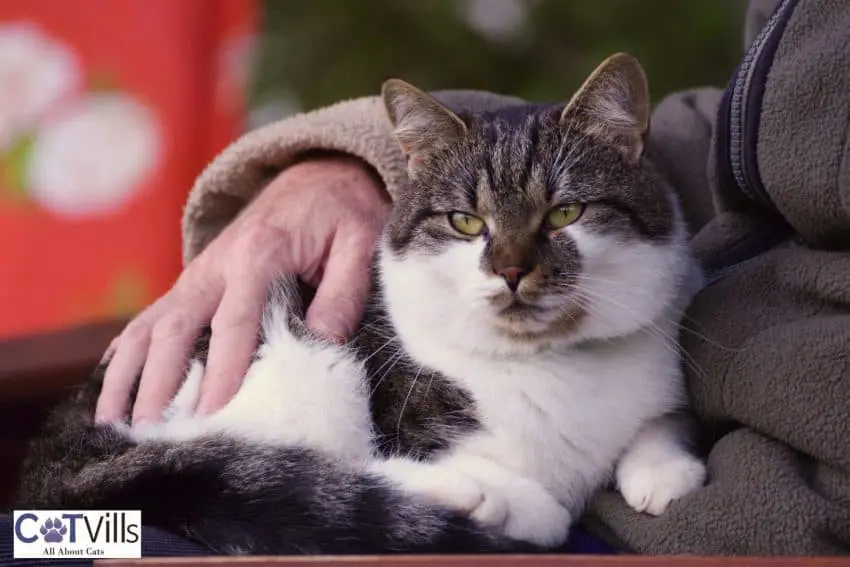
Most cat breeds can live up to 16–20 years, but their health declines as they age. Elder cats are likely to develop a wide range of medical conditions, such as:
- Kidney disease
- Arthritis
- Hypertension
- Urinary tract infection
- Tumors/cancer
- Gum disease
- Hypothyroidism
- Diabetes
So, an illness is one of the possibilities for why your senior cat is clingy all of a sudden. Clinginess is how your cat asks for help and tries to communicate that there’s a problem.
Other signs of sickness include:
- Urinating outside of the litter box
- Changes in food habits
- Decreased activity
The good news is that your vet can treat a chronic illness with medication as long as you catch it in time. So, don’t assume your elderly cat is dying before you get them to the vet for an evaluation.
Check out this video of the most common diseases in cats:
#2 Traumatic Experience
A traumatic experience can make a cat suddenly very clingy. It can be something simple, like loud noises, or something serious, like a bad encounter with dogs or other predators.
Some cats who were abused by their previous owner can also become more affectionate if something triggers a bad memory.
In these cases, your old cat sees you as a security blanket. You make your kitty feel safe, and that’s why your cat wants to be with you all the time.
#3 Change in Environment
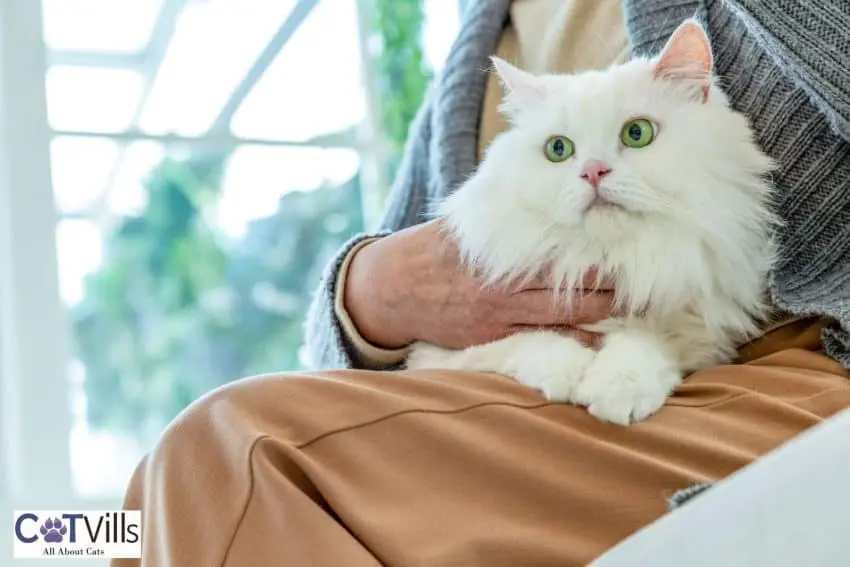
In general, cats don’t handle sudden changes in their environment well. But older felines are even more likely to become needy if something breaks their routine.
So, when you’re asking, “Why is my old cat so clingy?” you should think if something has changed in your house in recent weeks.
It doesn’t have to be a big change to stress your older cat and make them clingy.
Moving furniture, throwing away your cat’s senior-friendly scratching post, trying a new litterbox—all these can affect your cat’s mood.
#4 Feline Cognitive Decline
As specialists explain, “feline cognitive decline affects over half of cats between the ages of 11 and 15.” It’s even more common in animals over 16 years of age.
Cognitive decline affects your cat in the same way it affects humans. Your kitty has trouble remembering where the litter box, the bed, and the food bowls are.
You will also notice that your cat is more vocal than usual, can’t get around obstacles, seems lost, and suffers from anxiety.
Unfortunately, there’s no treatment for this condition. But you can lessen your cat’s discomfort and make its life a bit easier—more about this in a bit.
#5 Separation Anxiety
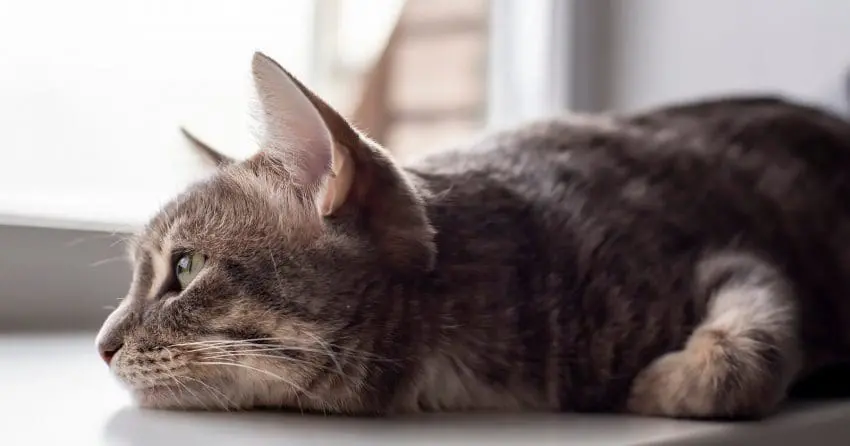
Most people assume that separation anxiety affects only dogs because cats are aloof.
However, separation anxiety is common in cats, especially in the most affectionate breeds, which bond closely with their human family.
In fact, a cat study on secure and insecure attachment concluded that over 64% of the participating felines had a secure attachment with their owners.
So, cats can develop separation anxiety, especially elderly felines who are sick or have lost their animal companion.
If your older cat has separation anxiety, you will also notice changes in vocalization, excessive grooming, inappropriate urination, and destructive tendencies.
Take a look at this video showing what cat separation anxiety looks like:
#6 Vision/Hearing Impairment
As people age, they start to have problems hearing and seeing. The same things happen to our feline companions, but cats don’t have the language to express the issue to their human caregivers.
Older cats become clingy because they can’t orientate themselves as well as before. They also have trouble locating their food bowls and toilet, so sticking close to you makes sense to them.
So, if my cat is clingy all of a sudden, I would ask the vet for a full check-up. Vision or hearing loss can also result from an underlying condition, such as high blood pressure.
#7 A Loss of Companion
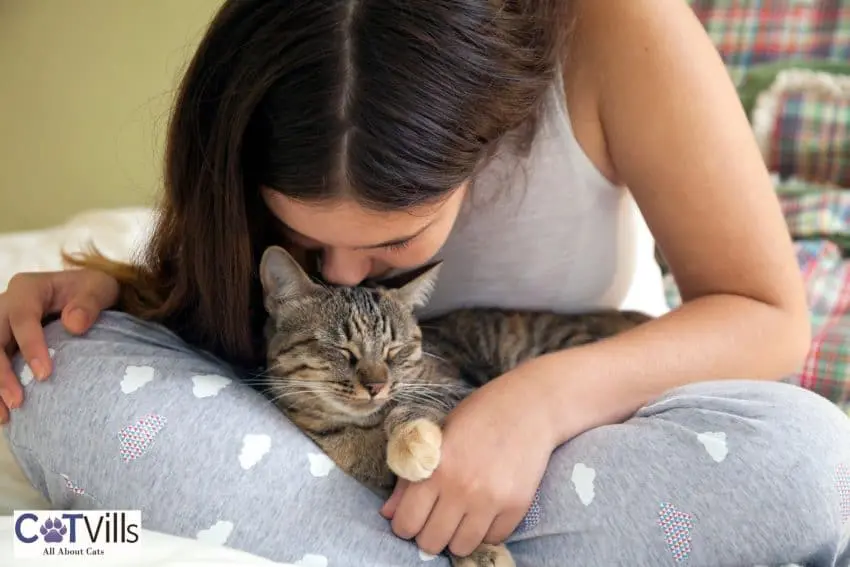
A cat can bond with its human owners, other cats, and even dogs. So, if your older cat loses a member of its clowder, it can become clingy all of a sudden.
Think about it from your cat’s point of view. Suddenly, there’s no one to play with or cuddle on the couch when the humans aren’t around.
In other words, your cat is grieving and is trying to communicate its feelings by being extra affectionate.
#8 Dying
Cats are notorious for hiding when sick or dying because they feel vulnerable to predatory attacks.
However, some cats do the opposite of hiding. They become more affectionate than usual and can’t get enough of your attention.
Your cat is scared because they don’t know what’s happening to them and want to be close to you for comfort and security.
It’s a great sign of trust and love if your older cat stays with you in its final moments.
Still, you shouldn’t panic if your older cat becomes clingy. Consult with your vet to determine your cat’s health status.
How to Reduce Your Cat’s Clinginess
While we all like when our cats are in the mood for a petting session, dealing with a clingy older cat can be exhausting for any cat owner.
#1 Talk with Your Vet
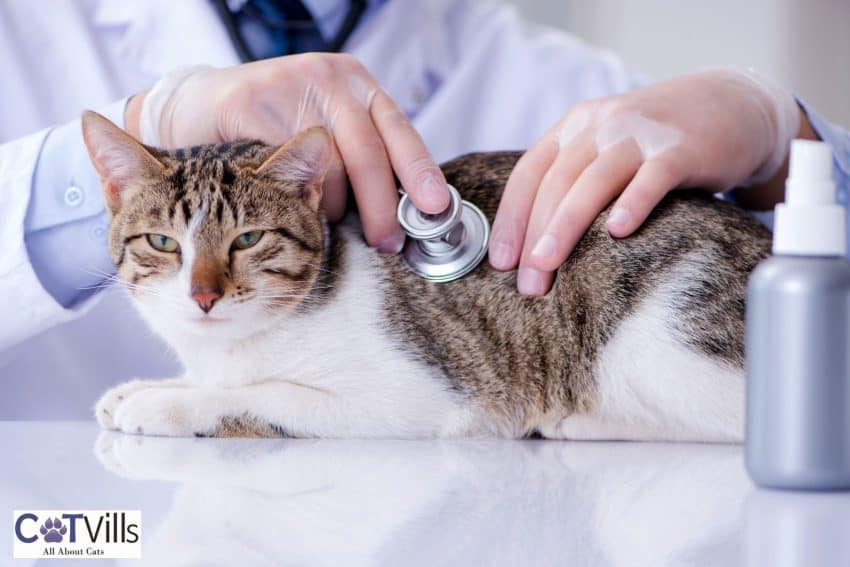
Depending on what’s causing your cat’s clinginess, you can improve your feline’s quality of life with medication.
While cognitive dysfunction can’t be cured, medication can improve the brain’s function and slow down the disease’s progression.
With the right treatment plan, you can also manage diabetes, renal failure, dental disease, and thyroid problems in older cats.
#2 Change the Litter Box
As we already explained, older cats often have vision problems and can’t get around obstacles. So, your elder pet has trouble using their old litter box, especially if it has high sides.
Switching to a senior-friendly litter box will make your cat’s daily life easier and reduce the risk of inappropriate elimination around the house.
Moreover, make sure your cat doesn’t have to go very far to use the litter box. Place a box in every room your cat uses for convenience.
#3 Reduce Stress
Reducing stress and maintaining a stable routine can help an older cat feel safe and secure.
Since elderly cats have trouble climbing, you should provide your cat with a safe den on the ground where your kitty can retreat in times of distress.
Also, consider calming pheromones and avoid making sudden changes in your elderly cat’s routine or environment.
#4 Provide Easy Access to Food AndWater
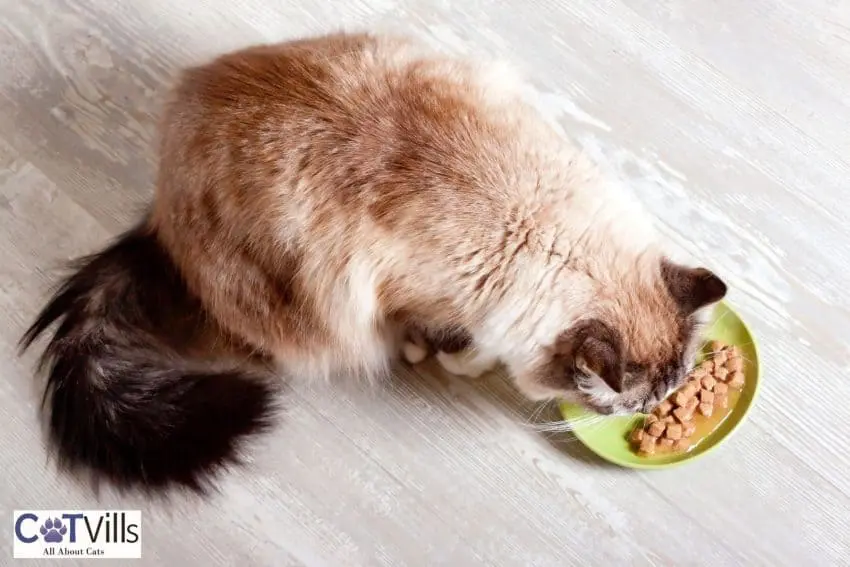
Sometimes cats can be very clingy when they’re hungry or thirsty. And some older cats can’t find their food bowls or have trouble reaching them.
So, ensure your cat has easy access to their food and water bowls by placing several bowls around the house. Monitor your cat and help them if you notice that they can’t find their dishes.
#5 Turn on a Light
Cats with vision problems have a hard time navigating the house at night.
But leaving a light on can make all the difference and reduce the risk of your feline waking you up in the middle of the night.
#6 Be Considerate
If your older cat is blind or deaf, you should be careful when you handle them. You don’t want to stress or scare your pet, or they will become needy.
Call your blind cat’s name before you approach, and avoid picking your cat if not absolutely necessary. Always approach deaf cats from the front to avoid scaring them.
#7 A New Kitten Isn’t Always the Solution
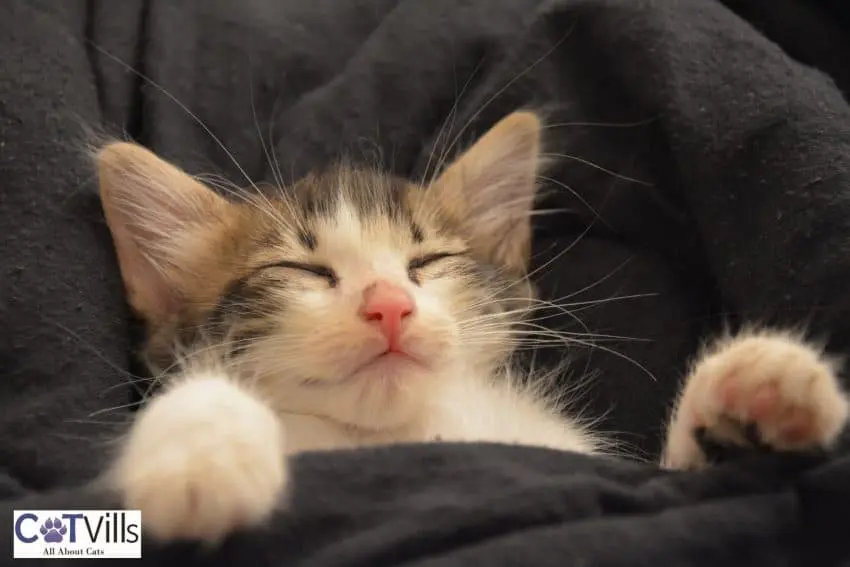
A playful new kitten isn’t a smart solution for resolving your older cat’s clingy behavior. While cats bond with other animals and get lonely, a new kitten is more likely to stress your feline than help.
If you think your older cat is clingy because of boredom and loneliness, you should try to enrich your cat’s environment and spend more time with your pet.
#8 Spay/Neuter Your Cat
If your cat is spayed before her first heat cycle, there is less than a 1% chance of her developing breast cancer.
And it will reduce the chance of your cat escaping to look for a mate or getting into fights with other tomcats.
#9 Spend Quality Time with Your Pet
Don’t forget that cats are social creatures. They won’t mind being alone in the house if you make up for your absence by playing with them later.
And remember to enrich your cat’s indoor environment as much as possible. Place perches next to the window so that your cat can watch the birds and provide a variety of cat toys.
#10 Establish Boundaries
When a cat learns certain behaviors, it’s twice as hard to unlearn them. That’s why it’s crucial to establish boundaries and not give in to your cat’s demands.
Make sure your cat knows it’s not allowed to follow you into the bathroom and that you provide cuddles and pets on your terms.
When Is It Time to Let Go?
If your older cat is clingy because they’re terminally ill or dying, it’s natural to ask yourself, Is it time to let go?
We know how hard this decision is, so we’re here with some tips to make it a bit easier for you to make up your mind.
#1 Uncontrollable Pain
Sometimes an older cat is clingy because they’re in immense pain.
If your vet can’t control the pain with medication, you should consider putting your cat to sleep.
While cats are good at hiding their discomfort, you’ll notice obvious signs of distress when the pain gets too much, such as growing, yowling, and aggression.
Don’t feel guilty about letting your cat go in peace instead of spending his or her last days in agony.
#2 Lack of Mobility and Hygiene
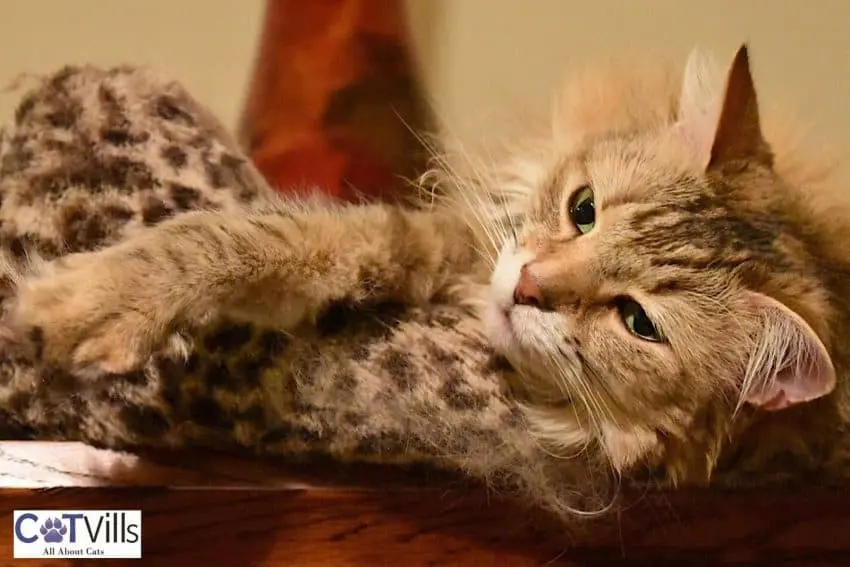
If your older cat can’t even get up from the bed to use the litter box, it might be time to say your goodbyes. No one likes to be confined to a spot, especially an animal that loves running and climbing.
Moreover, cats don’t have the energy to groom themselves when they’re dying. The coat becomes so rough and ill-kept that it’s obvious your cat won’t make a recovery.
#3 No Eating and Drinking
In general, once your older cat stops eating or drinking and the vet can’t do anything to fix it, it’s better to put your kitty to sleep. You don’t want to watch your beloved pet linger in this world for days.
Speaking from experience, it’s better to remember your cat as healthy and strong instead of seeing her or him reduced to a living skeleton.
#4 More Bad Days Than Good Days
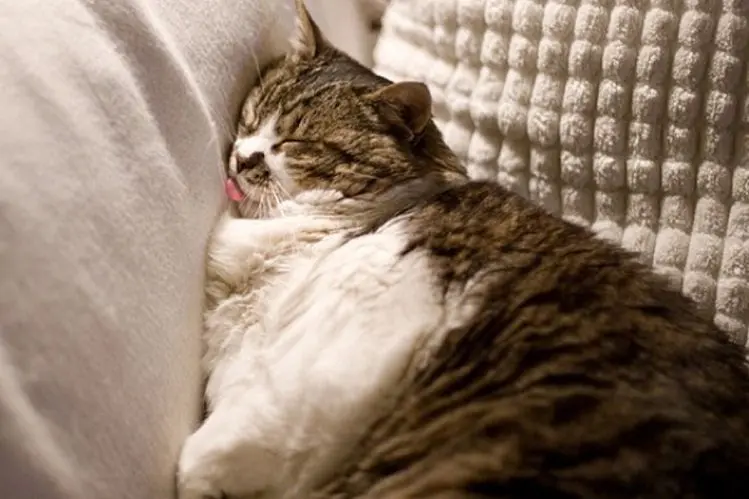
Before you put your cat to sleep, consider how many good and bad days your pet has. If your cat has good days when he or she is active and eating, with a couple of bad days in between, you can wait.
But when your cat’s quality of life deteriorates to the point where you have to force-feed your pet, it’s time to let your older cat go in peace.
You can also check out this quality life scale for cats to help you make a decision.
#5 Consult a Vet
Finally, you should talk to your vet about your older cat’s health condition and if palliative care can help your cat live a little bit longer.
Your vet can answer if your cat is suffering too much, advise you on the correct course of action, and help you deal with the body.
Conclusion
Now you know what you can do to manage the behavior.
Remember that clinginess doesn’t always signal an illness in cats, but it’s a common sign of an underlying problem. Get your cat to the vet so that they can diagnose the problem.
Does your cat become suddenly clingy? What did you do? Let us know in the comments below!
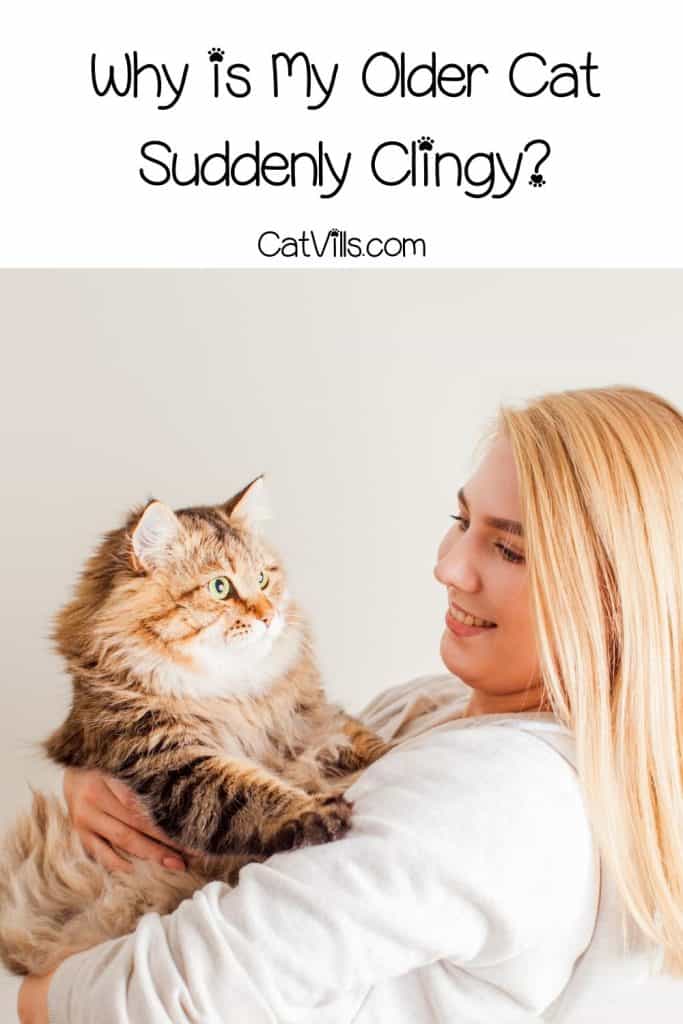

Olfa knows how to get things done and has a keen business sense that others admire. She’s always on the go, coming up with new ideas! Her ability to anticipate the needs of her readers and deliver information that they want is what makes CatVills such a success. She loves cuddling her cat Picaciu. He is her inspiration.
